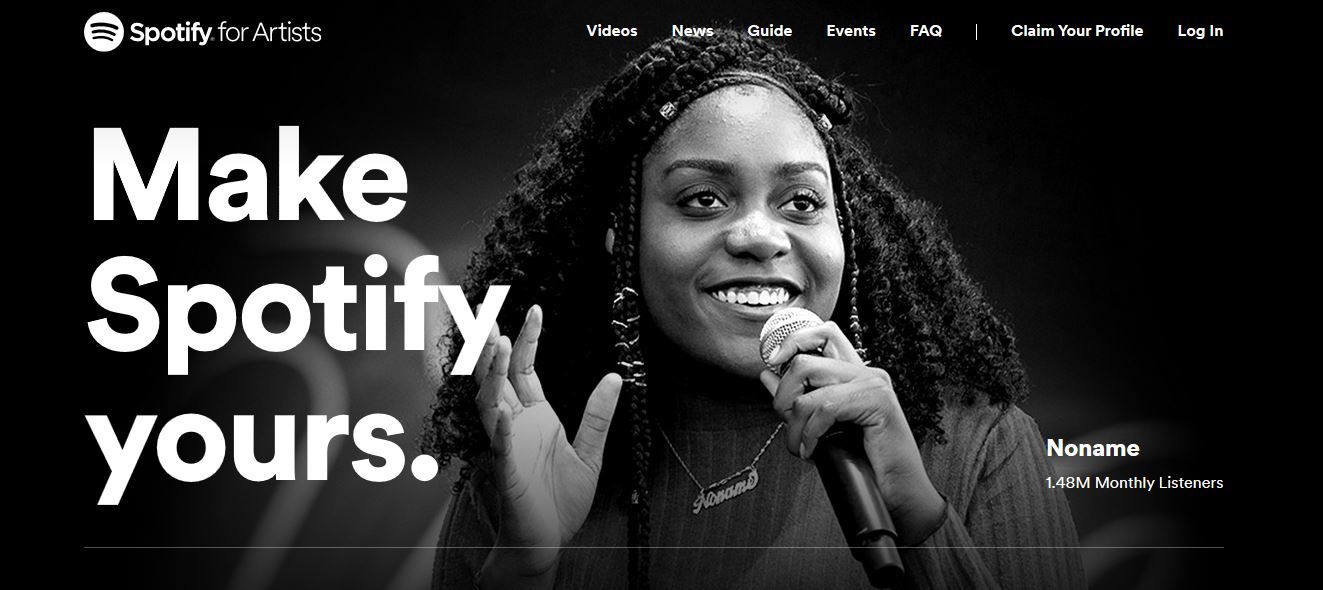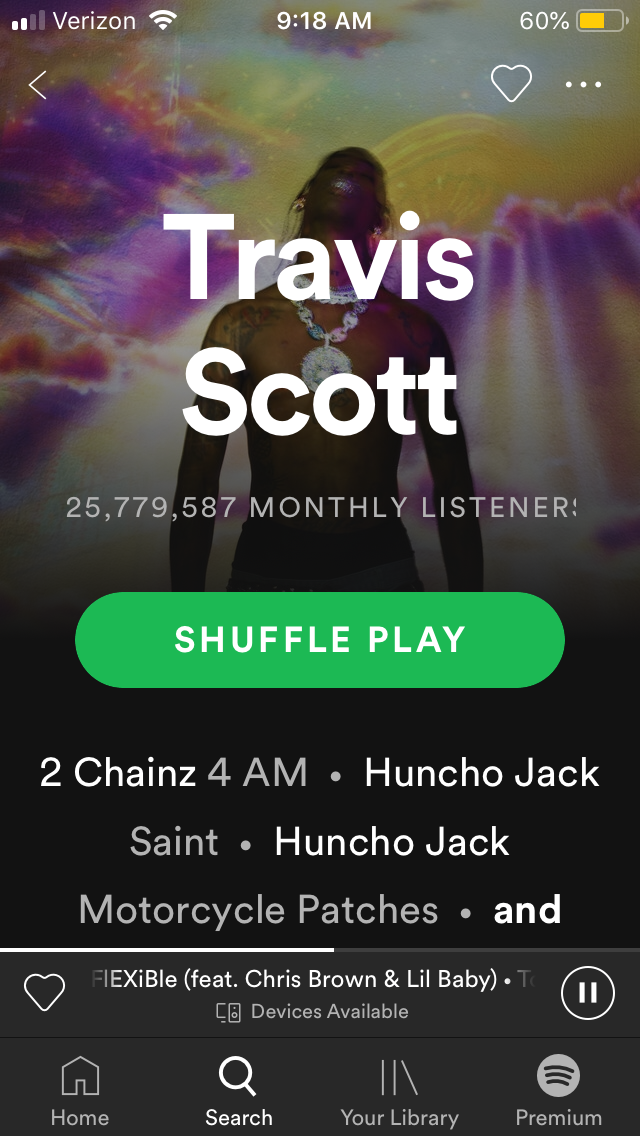The Nonsense of Spotify's Monthly Listeners Metric
Hello, I hope y’all are doing well this. I got sick last week and still recovering to be perfectly honest. Still Penny Fractions arrives in your inboxes. Even though the last week did have a quite a bit of news with Spotify—Q3 reports and stock buybacks—I’m going to focus on a slightly smaller concern. More specifically the stat that personifies Spotify doublespeak: Monthly Listeners.
A couple weeks ago I was talking to someone who expressed frustration with repeatedly being asked about the Spotify Monthly Listeners for acts they were pitching to labels and attempting to book shows, as if that was the only stat that mattered. Now one antidote isn’t a trend, but it retriggered my persistent disdain for what is essentially a hot air number, among a fairly wide swath of nonsense stats that populate the discourse around music streaming.

But now before I go fully off, let's go back to the origin of the Monthly Listener. Here is Daniel Ek speakining to Music Ally in early 2015:
We’re moving in general away from viewing streams as… it’s a hard metric for people to understand. It seems great in aggregate, but frankly you’ve seen many times on YouTube and other services, where someone says they have 100m streams, 300m streams. Is that a lot? It’s really hard to say...When you’re talking about an artist’s audience, and in particular the weekly audience that they have, it becomes so much easier for someone to visualise the impact they’re having. Weekly listeners is a pretty awesome way to understand the impact of Spotify.
Spotify in the following years never moved into a weekly listeners stats, but for my general concerns it doesn’t matter if it is monthly, weekly, or daily the inherent flaw of the stat is unchanged. Ek opened this quote I think with a fairly reasonable observation that realistically for most people there is little way to conceptualize the difference between 300 million streams vs. 100 million streams. Those are numbers used to describe populations, typically not music consumption. A solution there could be only counting listens after someone finishes half of the song, instead of just pressing play; perhaps the stat highlighted could be playlist saves instead of listens, or maybe a “Like” on the song is the true level of fan engagement that’s desired. There are plenty of options but all of these numbers would be much, much smaller than the raw number of plays for a track. That’s why Spotify’s effort to streamline this issue was to create the stat of “Monthly Listeners”.
What are Monthly Listeners? It’s a collection of the unique number of listeners an artist got over a month. That means if you listened Travis Scott’s “Sicko Mode” once on a playlist, but never listened to him again that’s one listener, where myself, who is still playing Astroworld daily, is still only a single listener. The stat isn’t trying to capture total number of plays or potential money the artist could make, it’s simply a stat that show audience/reach.

That in itself isn’t problematic. There is certainly value in knowing just how many total people are listening to an artist. The glaring issue with the stat is that its entirely regulated and confined to Spotify’s particular music streaming ecosystem. Let’s keep using Travis Scott as an example. Last time I checked he was at 25,861,694 Monthly Listeners (Yes, I know this is different than the screenshot, lol). Now if you go to his artist page and look at how many plays are coming from the RapCaviar playlist right now it is 2,552,916. That means 9.87% of Travis Scott’s Monthly Listeners are not engaging directly with Travis Scott but are just hearing his music on this singular playlist.
(Now again this isn't to inflate RapCaviar's reach, which is probably less than 2% of Spotify's overall user base but that's a newsletter for another day.)
The reason this stat came even more to my attention is because of a recent Digital Music News article on Spotify opening up their playlist submission platform. The piece said (bolding mine):
Spotify monitored the success of artists added to its playlists, and is proudly trotting out those stories now. The first beta case study comes from Belgian rapper Bryan Mg, who amassed nearly 30,000 new monthly listeners after getting added to the La Vida Loca playlist. Spotify reports that Mg now has 33,000 monthly listeners, up from 4,600 previously.
The inclusion quickly led to shows, according to Mg. “After the first release got picked up by Spotify I think about a month later I got my first booking for a club show,” Mg stated...
Sounds great for Mg, and also great for Spotify’s prevailing narrative that bigger streams builds exposure which builds other revenue-generators like touring. That narrative is true in many cases, though it often serves to deflect from criminally-low streaming royalty payouts.
My question here is this: Is this narrative even fucking true? There is nothing that says how many new subscribers Bryan Mg got from this playlist, no sense of how many people were attending these shows, or anything really to show a concrete shift that showed her meaningfully progressing her career. Now I took the bait and saw that Bryan Mg only has 895 followers on Spotify, while his current monthly listeners is over 160,000. Imagine trying to book a show saying you have less than 900 followers or is 160,000 Monthly Listeners?
What’s perverted about this stat to me is the disconnect between the number and the music put out by artists. Bryan MG’s numbers are mostly inflated by getting songs placed on a number of Spotify and Filtr playlists. If Spotify wanted this kid to have a million Monthly Listeners they could just put in a couple bigger playlists and that’s that. His subscriber numbers might go up a little bit but this isn’t organic or real musical growth. The only people this serves is Spotify, because an artist can hit a “good” number to upsell people about their level of success compared to showing non-existence sales data, ticket sales, or poorly performing YouTube videos. Thus perpetuates a circle where Spotify is viewed as the best metric for guaging success, when really it's the one just most aggressively inflating the stats.
Data and information about audiences is so important to an artist. Knowing how many people are coming to your show, how many buy merch, what kind of products do people want to buy, are they interested in online content, etc. Even a simple stat like subscribers that’s offered by Spotify and YouTube at very least says a person clicked a button to follow the music of an artist. Yet, the extreme passivity of Monthly Listeners and that Spotify’s own playlists dictate so much makes it laughable anyone would ever give it a second glance. A quantitative stat shouldn’t be dictated by the market whims of the platform and that’s example what Monthly Listeners displays.
6 Links 2 Read
Spotify: ‘Our Ads Business is a Real Trigger for Growth’ - Music Business Worldwide
I just want to highlight this single quote from Brian Benedik, Global Head of Advertising at Spotify: “I spent 15 years of my career in terrestrial radio so I have a fondness for it, but the measurement and the metrics that we have on the digital side… we are not using panels or surveys, we are actually monitoring people.” Who knew Benedik was actually the NSA.
Spotify is giving family account owners a free Google Home Mini - The Verge
*Whispers In Major Label* If you’re boss is trying to negotiate with Spotify, I’d point to this as sign #213123 that this company is starting to see growth slowing and don’t buying into whatever inflated Q4 numbers that arrive early next year.
'Stop coming for me': how pop stars are fighting burnout - The Guardian
If you’re reading this and know how healthcare works for artists either on the indie or major label side, please do email me. I have a lot of questions.
Apple explores iHeartMedia stake to boost its streaming service - Financial Times
I’ll write more on this another day, but I’ll just say that Daniel Ek completely side-stepped this story when asked about it on his investor call just confirmed how big a deal this could be.
The Spectacular Existential Crisis of Pandora - Rolling Stone
This was a very lovely press release about the current state of Pandora. Normally I’d avoid such milquetoast reporting, but Pandora is generally so overlooked that I wanted to include this little write-up. Though I did laugh when Roger Lynch said that Spotify’s Hot Country playlist had 5 million listeners...the number he cited is followers. Again, number are hard for even the most senior of people in music technology.
Even though I didn't want to go too deep into this, Tim Ingham's thoughts are certainly worth reading. My only note is that until Spotify starts showing real number attached to podcasting then I find it an interesting, but mostly empty promise of future plans.